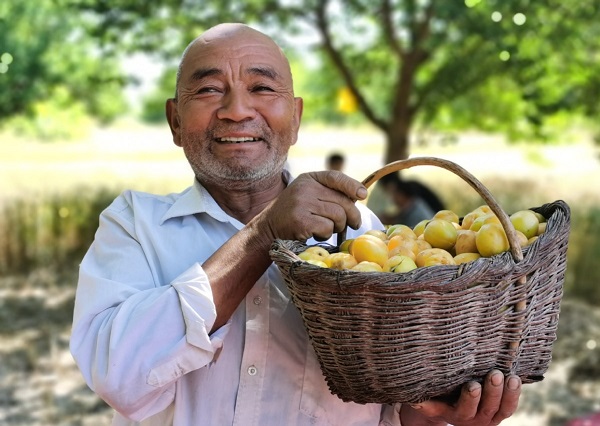Ningbo assistance to Kuqa speeds up city's growth

A farmer harvests white apricots in Tohqi village of Kuqa, Aksu prefecture of the Xinjiang Uygur autonomous region. [Photo by Mao Weihua]
The port city of Ningbo in the affluent eastern province of Zhejiang has spent the past decade providing assistance to the city of Kuqa in the western Xinjiang Uygur autonomous region in fields such as economic development, employment and healthcare.
The assistance program, introduced by the central government in 2010, pairs well-developed provinces and cities in China's east with less-developed cities and areas in Xinjiang in the west in order to hasten progress in the autonomous region.
Just as Ningbo has been paired with Kuqa, Beijing has been paired with Hotan prefecture and Shanghai with Kashgar.
Chen Zhihua, who has come from Ningbo to Kuqa to serve as the temporary president of the city's people's hospital, led a team of volunteer doctors to provide free medical consultations in Yongku Zhenxing village.
"I came to Kuqa to provide medical support from late May and will stay here for the next three years," Chen said, adding that one of his key goals in Kuqa will be to improve local residents' awareness of their health and help them protect themselves from chronic diseases.
The hospital has organized 95 voluntary medical consultations with about 12,000 villagers receiving treatment.
"Doctors use their downtime to join the events and we've handed out about 250,000 yuan ($34,000) worth of medicines in recent years. Every time we organize the voluntary medical activity, we are warmly welcomed by local residents!"
Chen said that he hopes the support he and his colleagues from Ningbo provide is not limited to medical diagnoses and treatment, but also the improvement of hospital management, communication skills between doctors and patients, technology support and talent production.
In addition to medical support, Ningbo has also channeled efforts into vitalizing Kuqa's economy by training livestreaming hosts for e-commerce.
Zhang Hao, chairman of the Kuqa E-commerce Association, who started his company in Xinjiang in 2018, has played an active role in encouraging residents in Yongku Zhenxing village to learn about e-commerce and train them into qualified livestream hosts.
"Xinjiang has good quality fruit because of its advantageous natural conditions. Government departments and e-commerce platforms have provided support for the sales of Xinjiang fruit, which has laid a good foundation for the development of the region's e-commerce," Zhang said.
Yongku Zhenxing village has two livestreaming rooms for selling products and most of the hosts are local villagers and returned college graduates.
"We started to train livestream anchors here in around March with an investment of about 600,000 to 700,000 yuan. We teach them the basic regulations and rules of operating livestreaming channels and the requirements of being a qualified e-commerce worker. We also introduce them to e-commerce or livestreaming positions at other companies offering openings of the kind," he said.
The e-commerce business still faces challenges such as having a shortage of talent and higher logistics costs due to long-distance transportation to other provinces across the nation.
"There are no systematic agriculture processing chains and strong support teams in web page design or operation. The e-commerce business has started a bit late here, so we need to work hard to catch up," he said. "We are planning to build some logistics warehouses outside the region to shorten logistics time and reduce costs this year, and we are also trying to get more supporting policies like subsidies from the government.
"We will take Zhejiang's experience in developing e-commerce and integrate the resources of Kuqa's agricultural companies and e-commerce companies to sell Xinjiang produce to provinces across the nation, and vitalize the economy of Kuqa," he added.
Since 2010, Ningbo has carried out 692 assistance projects in Kuqa with a direct investment of 2.3 billion yuan.
 Attractions
Attractions Dining
Dining Culture
Culture